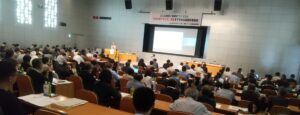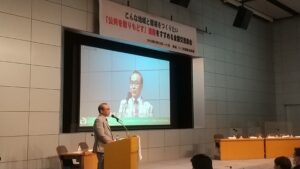Open up prospects of movement for insourcing public services: Jichiroren holds nationwide meeting
Jichiroren held a nationwide exchange meeting with the theme, “Create Community and Workplace We Hope: Promoting a Movement for Insourcing Public Services,” on May 20 and 21, 2023 at the Tsukuba International Congress Center in Ibaraki Prefecture. A total of 155 people took part in the meeting from Jichiroren’s regional organizations and prefecture offices throughout Japan.
The event marked a kickoff of the campaign, “Create Community and Workplace We Hope: A Movement for Insourcing Public Services,” adopted by Jichiroren’s annual convention in August 2022. The meeting was convened for Jichiroren members to learn, build a consensus, and exchange experiences to promote the campaign.
Jichiroren President Shingo Sakurai gave an opening address, followed by Secretary General Toshiaki Ishikawa giving a keynote report. Tomohiro Okada (professor of regional economics at Kyoto Tachibana University, professor emeritus of Kyoto University) gave a commemorative lecture entitled, “Open up prospects of a movement to restore public services: toward municipalities making use of the Constitution and local autonomy.”
Reflecting on some developments that have taken place for the last three years and five months during the Covid-19 pandemic, Okada talked about the deepening crisis in the lives and livelihoods of residents caused by skyrocketing prices as well as the increased risk of war in the wake of Russia’s invasion of Ukraine. He said that there is an ongoing move to allow the national government to reorganize and control universities and research institutions in the name of economic security. As for local autonomy, he warned of intensified moves by the government to control local governments and violate the right to self-government through digital reforms and fiscal inducements. “We are at a critical crossroads where the postwar Constitution and local government are facing the test of the very raison d’être of them. The pandemic has suddenly brought to light issues of Japan’s “public service” reforms. Under these developments, promoting a movement to reclaim the public and open up a new prospect is crucial,” he pointed out.
Following the lecture, a video titled, “What has happened to local public services?” was showed, presenting situations and initiatives across the country. In the talk session on the theme of “Reflecting the public”, five presenters representing their local unions reported on issues and challenges their workplaces face as well as efforts to solve them.
Themes of their presentations were as follows:
Deterioration of working environment, rapid increase in turnover of young workers, and crisis in maintaining public services publicly delivered (Kyoto); Increasing non-regular municipal workers, introduction of designated management system, weakened roles of the public (Saitama); Nurturing public services with parents–secure another daycare staff for children! (Aichi); With municipal mergers and population decline, what is happening to local public services (Ehime); and Municipal leaders from Nippon Ishin no Kai party running down public services—what municipalities should do (Osaka).


